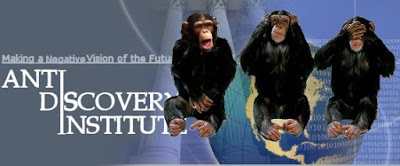 Fallacious Appeal to Authority, Misuse of Authority, Irrelevant Authority, Questionable Authority, Inappropriate Authority, Ad VerecundiamCredible
Fallacious Appeal to Authority, Misuse of Authority, Irrelevant Authority, Questionable Authority, Inappropriate Authority, Ad VerecundiamCredible experts possess the following attributes:
1. sufficient expertise in the subject matter in question.
2. claims made are within area(s) of expertise
3. adequate degree of agreement among the other experts in the subject in question
4. not significantly biased by subjective motivations or prejudices
5. expertise within a legitimate area or discipline (related to the subject matter)
6. the authority must be identified
Proponents of
intelligent [sick] design theory and other
creationists employ fallacious appeals to authority:
1. Individual scientists, most of who are
not credible experts in molecular genetics, have signed a
document declaring that they do not believe that misrepresented Darwinian explanations explain biological evolution. Even those signatories who are qualified in molecular genetics render their own opinions
suspect according to point 4 of the qualifications of acceptable authority below.
2. Well-known scientists who are convenient to
creationist deceits in other ways. These include:
a) [alleged] atheists who have made statements amenable to creationist arguments (e.g.
Fred Hoyle)
b) atheists duped, by virtue of their failing mental faculties, into agreeing to statements that serve creationist purposes (e.g.
Anthony Flew).
(Similarly, religionists fallaciously appeal to the fact that some scientists are religious believers. I think that we should dub this fallacy Fallacious Appeal to Conversion. The implication is: this scientist looked at the scientific evidence and became a believer, so God must exist. Religious apolologists often cite
Francis Collins, head of the Human Genome Project, who became a believer after witnessing human suffering, and not because of his study of biology. Interestingly, they typically avoid mention of biologist
Kenneth Miller.)
The theories of peer-reviewed scientists are dismissed, amongst other criticisms, as being biased in favor of an atheistic position, or as ambitious self-promotion, or as propaganda, or as being suspect because examples of scientific fraud have been uncovered in the past. Obviously, such attacks on the credibility of
accredited experts qualify as
ad hominem fallacies.
Possession of higher academic qualifications alone does
not qualify engineers or geologists, for example, to claim authority concerning biological evolution, which is outside their area of expertise (
1,
2,
5).
This is not to say that those with qualifications in engineering or geology could not have attained considerable knowledge concerning biology, molecular genetics, or biological evolution. However, it is reasonable to expect that such knowledge expressed by engineers or biologists would reflect agreement with, rather than run completely counter to, the opinions of experts in these areas (
3).
When the opinion of supposed authorities – particularly those whose academic qualifications lie outside the area under discussion(here, biology) – run directly counter to those of experts in the field, then the supposed authority is rightly suspected of
prejudice (
4) or
ignorance of the particular area (
1).
By the argument above, it
matters not whether 100, or
over 500 doctoral scientists, or any number of persons with a Ph.D. have signed a document expressing
doubts concerning evolution. The signed
statement reads: "We are skeptical of claims for the ability of random mutation and natural selection to account for the complexity of life. Careful examination of the evidence for Darwinian theory should be encouraged."
This statement misrepresents modern understanding of the mechanisms of
biological evolution in that modern geneticists and evolutionary biologists do
not claim that random mutation and natural selection
alone account for the complexity of life. Darwin lived, wrote, and died before the discoveries of genetics, so Darwinian theory has
already been examined by scientists and passed over in favour of the
modern synthesis of evolutionary theory. However, Darwin's mechanism of natural selection is
one of the recognized mechanisms affecting the frequency of alternative genes (alleles). The doctoral signatories have misrepresented the current understanding of the mechanisms of evolution.
It might be reasonable to say that a full exposition of molecular genetics and population are genetics are beyond the high school science curriculum, but it is not reasonable to conclude that students not yet capable of comprehending these concepts should be further confused by teaching
intelligent [sick] design theory (religion) alongside their simplified introduction to the fact of biological evolution. Religious teachings are readily available at the Church of each student's choice, and many websites are devoted to '‘intelligent
[sick] design
theory’', to creationism (
c), and to debate of
creationism vs evolution (
Y).
The "
Discovery Institute" and the "
Center for Science & Culture" first published its Scientific Dissent From Darwinism list in 2001, purportedly "to challenge "false statements" about Darwinian evolution made in promoting PBS's "Evolution" series."
"Darwinist efforts to use the courts, the media and academic tenure committees to suppress dissent and stifle discussion are in fact fueling even more dissent and inspiring more scientists to ask to be added to the list."[
s]
Considering the promises made in
The Wedge Document, this statement is glaring example of a
tu quoque fallacy – a "you too!" fallacy.
The fact remains that as an argument for insertion of
intelligent [sick] design theory alongside evolution in science classrooms, the
Scientific Dissent From Darwinism list remains an example of
fallacious appeal to authority.
The image could be dubbed a fallacious appeal to Hitler, I suppose. However, the point that I wished to make by using a readily identifiable icon for evil is that people are duped by authority figures who, at first,
appear to be promoting a message that might benefit the audience.
John G. West, associate director of
Discovery Institute's Center for Science & Culture.
Labels: ad verecundiam, biological evolution, fallacious appeal to authority, id theory, inappropriate authority, irrelevant authority, misuse of authority, questionable authority, The Wedge Document
 We the Contributors, in order to avoid repeating ourselves, have created a section devoted to explicating the Fallacies of Logic into which all arguers fall from time to time.
We the Contributors, in order to avoid repeating ourselves, have created a section devoted to explicating the Fallacies of Logic into which all arguers fall from time to time.

























